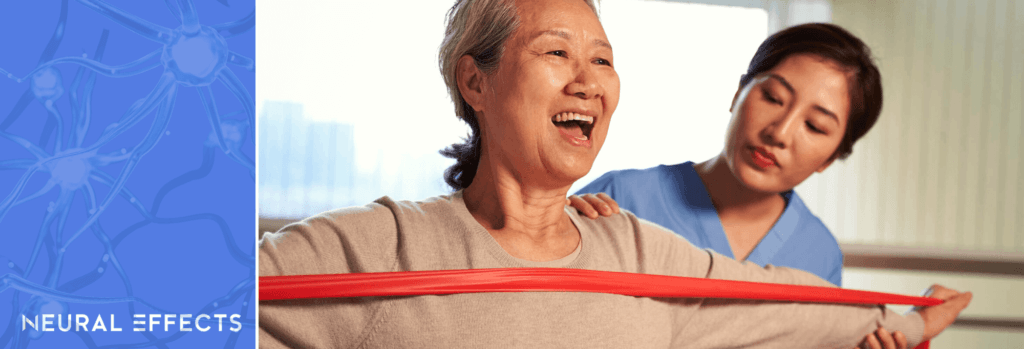If you’ve recently received a diagnosis of mild dementia or mild cognitive impairment (MCI), you may be looking for treatment options.
Although the symptoms of these two conditions are similar, significant differences may influence your choice of treatment, as we’ll see later in the article. There are also different types of dementia — such as Alzheimer’s disease, Lewy body dementia, vascular dementia, and mixed dementia — which can have an impact on the best treatment available for your condition.
While it’s easy to think about MCI as an earlier manifestation of dementia, not all patients with MCI develop dementia. In fact, researchers estimate that only 10% to 20% of patients aged 65 or older with MCI develop dementia over a one-year period. In many cases, the symptoms of MCI may stay the same for years or even improve with treatment. In contrast, patients with mild dementia will experience more serious symptoms with time, including increased forgetfulness, and difficulties with communication, attention, and problem solving. Everyday activities can become a challenge.
For both MCI patients and those with mild dementia, the best option for treatment — backed by research — is a combination of aerobic exercise and cognitive activities. This approach can delay the progression of the disease and allow patients to live independently for longer.
We emphasize physical and cognitive therapy for patients with MCI, combined with lifestyle changes such as consuming a brain-friendly, healthy diet and engaging in regular exercise at home. Patients with mild dementia can benefit greatly from these steps as well, but may also consider pharmacological options.
In this article, we’ll discuss…
- Why combining physical and cognitive activity is the most effective approach to mild dementia and MCI treatment
- How we use that therapy approach at Neural Effects
- Other therapies to improve mild dementia symptoms
- What to know about medication for mild dementia
- Lifestyle changes to delay disease progression
Neural Effects uses the latest evidence-based techniques to diagnose and help dementia patients. We are located in Provo, Utah, and serve anyone in Salt Lake City or the Utah Valley area. We are in-network for most types of medical insurance. Schedule your evaluation today.
The Best Mild Dementia Treatment Programs Combine Physical and Cognitive Therapy

A growing body of evidence suggests that the most effective way to treat patients with MCI or mild dementia is through a combination of physical and cognitive therapies. This approach produces better results than engaging in physical activity and cognitive training separately.
Exercise and cognitive therapy can delay cognitive decline, improve mood, and help patients perform their daily activities. Patients with less severe symptoms may even experience an improvement in memory and attention.
This is the approach we follow at Neural Effects. Treatment starts with a session of aerobic exercise followed by a series of activities to promote brain function, including, for example, word games and logic puzzles.
When we exercise, blood flow increases everywhere in the body, including in the brain. In simple terms, more blood to the brain means more energy and oxygen, which makes our brain perform better. The effect of improved blood flow is particularly visible in an area of the brain called the hippocampus, an area critical for learning and memory. After exercise, this area is involved in releasing a cascade of chemicals that help your brain perform better. One of these chemicals—brain-derived neurotrophic factor (BDNF) — promotes the growth of nerve cells and improves communication between cells in the brain. As a result, exercise boosts memory and improves cognitive function.
This effect is called the post-exercise cognitive boost (PECB), but it doesn’t last long after exercise. That’s why it’s important to follow the pattern of physical activity followed immediately by cognitive therapy. In a nutshell, you need to exercise so that your brain can obtain and use these chemicals to prevent cognitive decline. As an example, a study involving 70 to 80-year old patients with MCI showed that six months of aerobic training increased hippocampal volume by increasing levels of BDNF, which in turn improved cognitive function.
Engaging in regular physical activities also improves overall health and reduces the risk of coronary heart disease, stroke, certain cancers, type 2 diabetes, obesity, hypertension, and osteoporosis, to name just a few. Indirectly, this may also contribute to better brain health. For example, hypertension can lead to hardening of blood vessels in the brain and limit blood flow, and obesity is associated with inflammation in the brain.
What to Expect From Treatment at Neural Effects

Each patient at Neural Effects must undergo a neuropsychological test (also called a neurocognitive evaluation) to determine in detail what kind of cognitive issues are present. This exam includes tests to assess executive function, attention, memory, and language. Our therapists also assess patients for depression and anxiety.
Further reading: What a dementia evaluation involves
As described earlier, treatment starts with a session of aerobic exercise to prepare your brain to improve cognitive function, which is then followed by multiple cognitive exercises to improve the problems identified during the initial assessment, such as memory loss or difficulty concentrating. Our therapists can use a range of exercises to improve attention, thinking skills, and language, to name just a few.
They can also combine physical and cognitive efforts. For example, you might toss a ball back and forth while trying to figure out a four letter word by guessing other four letter words. (The therapist will tell you how many letters you got right and how many were in the correct spot. You have to use that information to deduce what the word is.)
Or, you might perform simple addition and subtraction while trying to sort cards face down according to suit. (For example, if you put them in order of hearts, diamonds, spades, and clubs, you’ll have to remember that during the whole exercise as you sort new cards into those piles.)
Patients can continue with weekly visits for as long as they wish. Some of our MCI patients opt to learn the therapy routine, then alternate between doing the exercises at home and coming into the office for ‘booster’ sessions. Patients with mild dementia often benefit from consistent appointments. If patients come with a caregiver, we provide instructions to the caregiver for how they can continue the exercises at home.
Other Possible Therapies to Treat Patients with Mild Dementia

In addition to the physical and cognitive therapy that we employ at Neural Effects, there are several other types of therapies that may be useful for patients with mild dementia.
Talk Therapy
Talking therapies — including cognitive behavioral therapy, psychotherapy, and counseling — are very effective for patients with mild to moderate dementia. They’re less effective for patients with advanced disease because these patients have attention and memory problems, as well as poor communication skills, which are vital to benefit from talk therapy.
During therapy, patients can talk openly about daily life and how they feel about their diagnosis of dementia. They can learn to cope with symptoms and adjust to their condition more successfully. There is evidence that engaging in talk therapy reduces depression and anxiety and improves quality of life.
Occupational Therapy
Occupational therapists work with patients and their families to encourage independent living as much as possible. Although patients with mild dementia are still able to function without much help, they can still benefit from the support of an occupational therapist. At this stage, patients start to forget simple things like appointments, where they placed their keys, or if they’ve taken their medication. Memory aids like calendars and medication reminders can help patients carry out their daily activities.
One approach showing positive results is to set a specific goal to learn a new skill during therapy. This could be anything from learning to use new technology to taking part in social activities. Therapists help patients identify their goals and find ways around the problems that prevent them from achieving them.
Reminiscence Therapy
Reminiscence therapy involves talking about memories and past experiences to stimulate cognitive activity and improve quality of life. This therapy can help dementia patients focus on the positive aspects of their lives and reduce depression and anxiety. It also improves cognition and reduces aggressive behavior.
Reminiscence therapy can be particularly useful for patients with mild dementia if they’re struggling with depressive symptoms. These patients often enjoy using a variety of props, such as videos, photos, music, and even food that holds particular meaning to them.
Bright Light Therapy
We all have an internal clock that tells us when it’s time for bed and when it’s time to wake up. In patients with dementia, this clock is often disrupted, leading to drowsiness during the day and difficulty sleeping at night. Some studies show that bright light therapy can help regulate the circadian rhythm and, as a result, improve cognitive function, reduce depressive symptoms, and improve sleep quality. It’s particularly useful for patients with mild dementia and becomes less effective as the disease progresses.
During a session of bright light therapy, patients sit in front of a light box that provides 30 times more light than the average bulb for a set amount of time.
Animal-Assisted Therapy
Animal-assisted therapy (also called pet therapy) involves the use of animals to help dementia patients. The most common animals in pet therapy are dogs, but cats, birds, and even horses can also be used. It’s not just about petting the animal; there’s also a component of physical exercise. For example, patients with mild dementia can take the dog for a walk and are encouraged to throw toys for the animal they’re with.
This therapy is aimed at improving both the patient’s mental and physical health. It reduces the feeling of anxiety, improves short-term memory, reduces blood pressure, and improves cardiovascular health.
Art Therapy
Art therapy can be a fun and relaxing way for dementia patients to express their creativity. For patients in the early stages of the disease, it may also involve learning about classic works of art and art appreciation. The aim is to improve mood and self-esteem, encourage speech, and increase attention. Art gives patients a sense of accomplishment and purpose while offering a way to interact with others. Activities include drawing, sculpting with clay, painting, making cards and jewelry, participating in community art projects, and more.
Using Medication to Manage Mild Dementia

Non-drug approaches like the ones described above can be very effective in delaying the progression of dementia and controlling symptoms such as poor sleep, depression, and low mood. But depending on your situation, your doctor may recommend medication.
Some medications might temporarily relieve dementia symptoms related to memory and cognitive function, or they might address other symptoms that often accompany dementia, such as sleep disturbances and depression. These medications should always be used with the support of your doctor and, as much as possible, alongside non-pharmacological interventions (therapy).
Remember that medications come with side effects and that the doctor may need to troubleshoot dosage. It’s key to follow up with the prescribing physician or neurologist on a regular basis to make sure the medications are having the intended effect.
Out of the FDA-approved drugs available at the moment, the options most often recommended to patients with mild dementia are cholinesterase inhibitors, such as donepezil (Aricept), rivastigmine (Exelon), and galantamine (Razadyne). These drugs are designed to slow down the rate of memory decline by preventing the breakdown of acetylcholine, a chemical that helps brain cells communicate with each other.
As the disease progresses, doctors may also prescribe memantine (Namenda, Ebixa). This drug helps protect against brain damage by regulating the activity of glutamate, a chemical messenger in the brain associated with learning and memory. This is mostly for patients with moderate to severe dementia, since studies showed it has limited value for patients with mild dementia.
In June 2021, the U.S. Food and Drug Administration approved a new drug to treat dementia called aducanumab (Aduhelm). Instead of dealing with symptoms, this is the first time a drug was developed to target and remove beta-amyloid plaques, one of the hallmarks of Alzheimer’s disease. In several clinical trials, patients who received aducanumab experienced a reduction of amyloid beta plaques in the brain, but about 40% of patients experienced serious side effects like brain swelling and brain bleeds. Currently, the FDA is requiring additional studies to assess the benefits and risks, and to identify which patients and what forms of dementia would benefit from this drug.
Treating the Accompanying Symptoms of Dementia
Dementia is often associated with a number of other non-cognitive symptoms, such as depression, anxiety, poor sleep, agitation, and aggressive behavior. In early dementia patients, these symptoms may respond well to non-drug approaches, but sometimes medication is required to provide more relief.
Medication to Treat Depression and Anxiety
Symptoms of depression and anxiety are common in people with MCI and mild dementia, often caused by difficulties adjusting to their diagnosis and associated cognitive problems. These symptoms can usually be treated with antidepressants, including tricyclic and selective serotonin reuptake inhibitors (SSRIs). Starting at a low dose is vital, as some studies have shown an associated increased risk of falls in older adults. There’s also limited information about the long-term use of these drugs, as most studies do not follow patients for more than 12 months. It’s important to discuss pros and cons with your doctor before starting any treatment.
In later stages of dementia, patients may develop aggression, restlessness, and delusions and engage in physical and verbal outbursts. These symptoms can be managed with antipsychotics, but their use is rare for patients with mild dementia.
Medication to Treat Sleep Problems
Difficulty falling asleep or waking up frequently in the middle of the night can cause a lot of difficulties for patients. Medication to treat sleep disorders should be seen as a last resort, as patients will become dependent on these after long-term use. Several major medical and psychiatric organizations, including the American Geriatrics Society, advise against prescribing these drugs to treat older adults as there is a high risk of serious adverse effects from these medications.
Are Prescription Drugs a Good Option for Patients With MCI and Early Dementia?
If you have a diagnosis of mild cognitive impairment, the best option is to use non-drug approaches like the ones described above.
For patients with mild dementia, there are some drug treatments which could be a viable option in certain circumstances. If you have a strong network of family members and friends that can support you, and you don’t have any other medical conditions or risk factors, it may be advantageous to delay the use of medication as long as possible and rely on non-pharmacological methods like the one we use at Neural Effects.
However, it’s important to recognize that in some cases, patients may benefit from medication to delay cognitive decline or address sleeping problems and depression. For example, a study showed that starting anti-dementia medication soon after diagnosis reduced the risk of admission to a dementia care unit, especially for unmarried patients without a caregiver or those with other medical conditions.
If you need more information, we’ve written in more detail about what medication to use for patients with dementia in another post.
Lifestyle Changes That Can Help You Cope With Early Dementia

For patients living with MCI and early dementia, there are many lifestyle changes that can help them maintain independence for as long as possible and improve quality of life.
Engage in Regular Exercise
Multiple studies have shown that physical activity is very beneficial for patients with MCI or dementia. Mild-to-moderate exercise increases fitness and strength, reduces stress, improves symptoms of depression and other mental health issues, and may even slow down cognitive decline. Aerobic exercise, which increases your heart rate, provides the most benefit for physical and cognitive health. Activities like walking, jogging, swimming, or cycling are all good options. Even gardening can be quite helpful.
Follow a Healthy Diet
The best current advice for dementia patients is to follow healthy eating patterns rich in whole grains, fruits, and vegetables and avoid processed, fatty, and sugary foods. The MIND diet and the Mediterranean diet are good examples of diets that are not only nutritious but may also help protect your brain.
Challenge Your Brain
One of the best ways to prevent cognitive decline is to keep your brain active. Rekindle an old hobby, learn a new skill, or challenge yourself to try a new activity that can help increase your brain activity. Other ideas include chess, video games, word and number puzzles, jigsaws, crosswords, and memory games.
Stay Socially Active
Strong relationships with loved ones can have a major impact on your health. Even 10 minutes of conversation can help you feel less isolated. Pursue activities that you enjoy, such as going out for a walk with friends or joining an art club for seniors.
Some may find it comforting to interact with other patients with similar symptoms and their carers. Building a support network with other mild dementia patients can help the group adapt to what they’re experiencing and reduce the stigma associated with this condition.
Check Conditions That May Cause Dementia Symptoms
Sometimes, patients experience symptoms that seem to point towards dementia, but they may be caused by other conditions, many of which are treatable. For example, depression, nutritional deficiencies, and side effects from medications can all cause symptoms that can be mistaken for mild dementia. If you’re experiencing any symptoms that you believe may be dementia, consult your healthcare provider for a complete check-up.
Neural Effects uses the latest evidence-based techniques to diagnose and help dementia patients. We are located in Provo, Utah, and serve anyone in Salt Lake City or the Utah Valley area. We are in-network for most types of medical insurance. Schedule your evaluation today.
